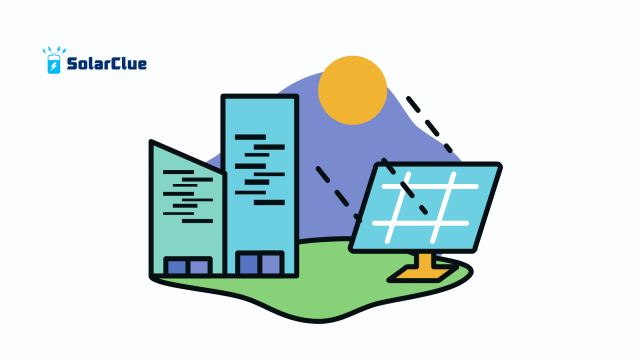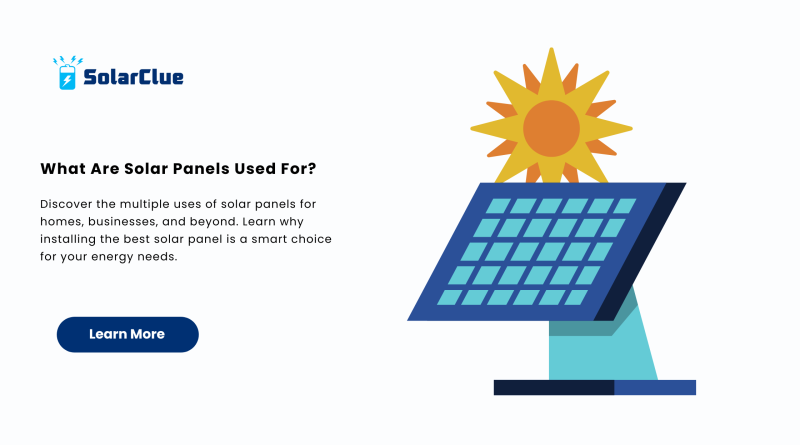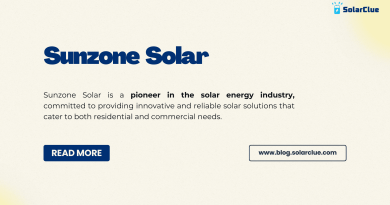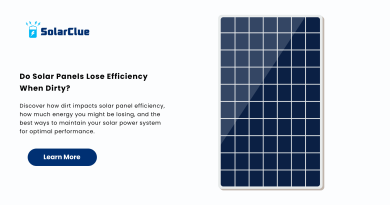What Are Solar Panels Used For?
Today, the world is embracing clean energy more than ever before, and solar panels are at the heart of this revolution. But what are solar panels used for exactly? Many people think solar panels are only for homes to save on electricity bills, but their applications go far beyond residential rooftops. From powering agricultural water pumps to running massive industrial setups, solar energy has transformed the way we consume and think about power. In this blog, we’ll explore all the major and surprising uses of solar panels, why they matter, and how you can benefit from installing the best solar panel for your specific needs.
Table of Contents
- 1 Understanding Solar Panels
- 2 Main Uses of Solar Panels
- 3 Surprising and Innovative Uses of Solar Panels
- 4 Solar Panel Benefits Across Sectors
- 5 Why Choose the Best Solar Panel for Each Use Case?
- 6 Solar Panel Systems: Types Based on Usage
- 7 Real-World Examples
- 8 Common Misconceptions About Solar Panels
- 9 Financial Incentives and Support in India
- 10 How to Maximize Solar Panel Benefits
- 11 Environmental Impact of Solar Panels
- 12 Conclusion
- 13 FAQs
Understanding Solar Panels
Solar work by capturing sunlight and converting it into electricity using photovoltaic (PV) cells. This electricity can either be used immediately, stored in batteries for later, or sent back to the power grid. Thanks to advancements in solar panel efficiency and reduced manufacturing costs, solar power systems are now more accessible than ever.
Main Uses of Solar Panels
1. Residential Energy Supply
One of the most popular answers to “what are solar panels used for” is residential energy generation. Homeowners install solar panels for home to power:
-
Lights and fans
-
Refrigerators and microwaves
-
Water heaters and air conditioners
-
Televisions and computers
By choosing the best solar panel for home, residents can enjoy lower electricity bills, energy independence, and increased property value.
2. Commercial and Industrial Power
Businesses, factories, and industries increasingly use solar panels to reduce operational costs. Large solar power systems provide energy for:
-
Offices and malls
-
Hospitals and schools
-
Manufacturing plants
-
Warehouses and logistics hubs
The solar benefits here include stable electricity prices, reduced carbon footprint, and positive brand image.
3. Agriculture and Farming
In rural areas, solar panels power:
-
Irrigation pumps
-
Crop drying systems
-
Solar fencing
-
Cold storage for perishables
Solar-powered water pumps have transformed Indian agriculture, making farmers less dependent on erratic electricity supply.
Surprising and Innovative Uses of Solar Panels
1. Solar-Powered Transportation
Solar panels are now used to charge electric vehicles (EVs) at solar charging stations. Solar boats, cars, and even aircraft are under development to reduce fossil fuel dependency.
2. Street and Traffic Lighting
Cities are increasingly installing solar-powered street lights and traffic signals, saving energy costs and reducing grid load.
3. Telecommunications and Satellites
Many communication towers and satellites use solar for continuous power supply, especially in remote or hard-to-reach locations.
4. Remote and Off-Grid Areas
Villages without grid access use solar to power:
-
Schools
-
Clinics
-
Homes
-
Water purification systems
Solar energy brings light and hope to millions where traditional infrastructure is too expensive to build.
5. Portable Solar Devices
From backpacks that charge phones to foldable panels for camping, solar is everywhere. These devices provide backup power during travels and emergencies.
Solar Panel Benefits Across Sectors
1. Energy Independence: Reduce reliance on government grids and generators.
2. Environmental Protection: Drastically lower your carbon footprint.
3. Financial Savings: Enjoy decades of reduced or zero electricity bills.
4. Low Maintenance: Modern solar need minimal upkeep.
5. Durability: With warranties up to 25 years, panels offer long-term value.
Why Choose the Best Solar Panel for Each Use Case?

Not all solar panels are created equal. Depending on your needs, you’ll want to pick the best solar based on:
1. Efficiency rating
2. Weather resistance
3. Warranty period
4. Manufacturer reputation
5. Type of solar cells (monocrystalline vs polycrystalline)
Explore top-rated options and get custom solutions by visiting solarclue.com.
Solar Panel Systems: Types Based on Usage
| System Type | Description | Ideal For |
|---|---|---|
| Grid-Tied | Connected to the main grid; no battery needed | Homes, businesses |
| Off-Grid | Independent; uses battery storage | Remote areas, farms |
| Hybrid | Combines grid and battery backup | Homes needing flexibility |
Choosing the right system type ensures maximum solar energy utilization.
Real-World Examples
1. Homeowner in Chennai: A 3kW rooftop solar power system reduced his electricity bill by ₹2,800 monthly.
2. School in Pune: Installed a 20kW system to run lights, fans, and computer labs entirely on solar energy.
3. Farm in Punjab: Shifted irrigation pumps to solar panels, saving ₹1 lakh annually in diesel costs.
Common Misconceptions About Solar Panels
1. Myth: Solar panels don’t work in cloudy weather.
Fact: Panels still generate about 10–25% of peak power during overcast days.
2. Myth: Solar systems are too expensive.
Fact: With subsidies and falling panel costs, payback periods are now just 3–5 years.
3. Myth: Maintenance is hard.
Fact: Cleaning panels every 2–3 months is usually enough.
Financial Incentives and Support in India
1. Subsidies: Up to 40% for residential rooftop installations
2. Net Metering: Sell surplus energy back to the grid
3. Income Tax Benefits: Deductions available for solar loans under section 80EE
Learn how to maximize these benefits by consulting experts at solarclue.com.
How to Maximize Solar Panel Benefits
1. Install panels with a south-facing orientation
2. Use high-efficiency modules
3. Regularly clean and inspect your system
4. Install smart inverters with MPPT technology
5. Monitor your energy production through mobile apps
These practices ensure you get the most out of your solar panel investment.
Environmental Impact of Solar Panels
Switching to solar energy has a massive positive impact:
1. Reduces dependence on coal and oil
2. Cuts down greenhouse gas emissions
3. Promotes clean air and water
4. Helps combat global climate change
A 5kW system can offset the carbon emissions of driving a car for nearly 15,000 km annually.
Conclusion
So, what are solar panels used for? Far more than just residential rooftops! From agriculture to aerospace, from city streets to remote villages, solar panels are lighting up lives across sectors. Whether you’re a homeowner aiming to slash bills, a business seeking energy independence, or a farmer wanting irrigation reliability, installing the best solar panel is a decision you won’t regret.
Ready to explore how solar can transform your life? Visit solarclue.com today for tailored solutions. Also, check out more inspiring real-world solar stories at blog.solarclue.com and join the energy revolution!
FAQs
1. Can I install solar panels without a battery?
Yes, with a grid-tied system that sends excess power back to the grid.
2. Do solar panels work during power cuts?
Only if you have an off-grid or hybrid system with battery backup.
3. Are there portable solar panel options?
Yes, from solar chargers to foldable solar kits for travel.
4. How long do solar panels typically last?
Most come with a 25-year performance warranty and often last even longer.
5. What is the best time of year to install solar panels?
Install anytime, but pre-summer months (February to April) are ideal to maximize immediate benefits.



